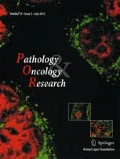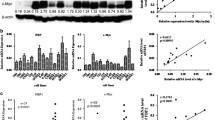Abstract
Molecular alterations in PIK3CA oncogene that encodes the p110α catalytic subunit of phosphatidylinositol 3-kinase (PI3K p110α) are commonly found in human cancers. In this study, we examined the expression of PI3K p110α and PIK3CA gene amplification in 74 nasopharyngeal carcinoma (NPC) cases. Immunohistochemical staining demonstrated overexpression of PI3K p110α protein in 44.6 % (33/74) of NPCs and 4.8 % (2/42) of the adjacent normal nasopharyngeal mucosa. Copy number of PIK3CA gene was successfully analyzed in 51 of the total NPC cases and 19 non-malignant nasopharynx tissues by quantitative real-time PCR. Using mean + 2(standard deviation) of copy numbers in the non-malignant nasopharynx tissues as a cutoff value, PIK3CA copy number gain was found in 10 of 51 (19.6 %) NPC cases. High PI3K p110α expression level was correlated with increased PIK3CA copy number (Spearman’s rho =0.324, P = 0.02). PI3K p110α expression and PIK3CA copy number did not associate with Akt phosphorylation, and patient and tumor variables. This study suggests that PI3K p110α overexpression, which is attributed, at least in part, to PIK3CA gene amplification, may contribute to NPC pathogenesis. However, these molecular aberrations may not be responsible for activation of Akt signaling in NPC.


Similar content being viewed by others
References
Altomare DA, Testa JR (2005) Perturbations of the AKT signaling pathway in human cancer. Oncogene 24(50):7455–7464
Vivanco I, Sawyers CL (2002) The phosphatidylinositol 3-kinase AKT pathway in human cancer. Nat Rev Cancer 2(7):489–501
Bruhn MA, Pearson RB, Hannan RD, Sheppard KE (2013) AKT-independent PI3-K signaling in cancer - emerging role for SGK3. Cancer Manag Res 5:281–292
Samuels Y, Waldman T (2010) Oncogenic mutations of PIK3CA in human cancers. Curr Top Microbiol Immunol 347:21–41
Kang S, Bader AG, Vogt PK (2005) Phosphatidylinositol 3-kinase mutations identified in human cancer are oncogenic. Proc Natl Acad Sci U S A 102(3):802–807
Samuels Y, Diaz Jr LA, Schmidt-Kittler O, Cummins JM, Delong L, Cheong I, Rago C, Huso DL, Lengauer C, Kinzler KW, Vogelstein B, Velculescu VE (2005) Mutant PIK3CA promotes cell growth and invasion of human cancer cells. Cancer Cell 7(6):561–573
Engelman JA (2009) Targeting PI3K signalling in cancer: opportunities, challenges and limitations. Nat Rev Cancer 9(8):550–562
Shayesteh L, Lu Y, Kuo WL, Baldocchi R, Godfrey T, Collins C, Pinkel D, Powell B, Mills GB, Gray JW (1999) PIK3CA is implicated as an oncogene in ovarian cancer. Nat Genet 21(1):99–102
Wu G, Xing M, Mambo E, Huang X, Liu J, Guo Z, Chatterjee A, Goldenberg D, Gollin SM, Sukumar S, Trink B, Sidransky D (2005) Somatic mutation and gain of copy number of PIK3CA in human breast cancer. Breast Cancer Res 7(5):R609–R616
Bertelsen BI, Steine SJ, Sandvei R, Molven A, Laerum OD (2006) Molecular analysis of the PI3K-AKT pathway in uterine cervical neoplasia: frequent PIK3CA amplification and AKT phosphorylation. Int J Cancer 118(8):1877–1883
Chang ET, Adami HO (2006) The enigmatic epidemiology of nasopharyngeal carcinoma. Cancer Epidemiol Biomark Prev 15(10):1765–1777
Yip WK, Leong VC, Abdullah MA, Yusoff S, Seow HF (2008) Overexpression of phospho-Akt correlates with phosphorylation of EGF receptor, FKHR and BAD in nasopharyngeal carcinoma. Oncol Rep 19(2):319–328
Yip WK, Seow HF (2012) Activation of phosphatidylinositol 3-kinase/Akt signaling by EGF downregulates membranous E-cadherin and beta-catenin and enhances invasion in nasopharyngeal carcinoma cells. Cancer Lett 318(2):162–172
Chou CC, Chou MJ, Tzen CY (2009) PIK3CA mutation occurs in nasopharyngeal carcinoma but does not significantly influence the disease-specific survival. Med Oncol 26(3):322–326
Liu P, Li DJ, Qin HD, Zhang RH, Chen LZ, Zeng YX (2007) Screening for mutations in the hotspot mutation regions of PIK3CA gene in nasopharyngeal carcinoma. Ai Zheng 26(1):15–20
Or YY, Hui AB, To KF, Lam CN, Lo KW (2006) PIK3CA mutations in nasopharyngeal carcinoma. Int J Cancer 118(4):1065–1067
Fendri A, Khabir A, Mnejja W, Sellami-Boudawara T, Daoud J, Frikha M, Ghorbel A, Gargouri A, Mokdad-Gargouri R (2009) PIK3CA amplification is predictive of poor prognosis in Tunisian patients with nasopharyngeal carcinoma. Cancer Sci 100(11):2034–2039
Mao C, Zhou J, Yang Z, Huang Y, Wu X, Shen H, Tang J, Chen Q (2012) KRAS, BRAF and PIK3CA mutations and the loss of PTEN expression in Chinese patients with colorectal cancer. PLoS One 7(5):e36653
Yip WK, Choo CW, Leong VC, Leong PP, Jabar MF, Seow HF (2013) Molecular alterations of ras-Raf-mitogen-activated protein kinase and phosphatidylinositol 3-kinase-Akt signaling pathways in colorectal cancers from a tertiary hospital at Kuala Lumpur, Malaysia. APMIS 121(10):954–966
Hou P, Liu D, Shan Y, Hu S, Studeman K, Condouris S, Wang Y, Trink A, El-Naggar AK, Tallini G, Vasko V, Xing M (2007) Genetic alterations and their relationship in the phosphatidylinositol 3-kinase/Akt pathway in thyroid cancer. Clin Cancer Res 13(4):1161–1170
Aleskandarany MA, Rakha EA, Ahmed MA, Powe DG, Paish EC, Macmillan RD, Ellis IO, Green AR (2010) PIK3CA expression in invasive breast cancer: a biomarker of poor prognosis. Breast Cancer Res Treat 122(1):45–53
Jehan Z, Bavi P, Sultana M, Abubaker J, Bu R, Hussain A, Alsbeih G, Al-Sanea N, Abduljabbar A, Ashari LH, Alhomoud S, Al-Dayel F, Uddin S, Al-Kuraya KS (2009) Frequent PIK3CA gene amplification and its clinical significance in colorectal cancer. J Pathol 219(3):337–346
Woenckhaus J, Steger K, Werner E, Fenic I, Gamerdinger U, Dreyer T, Stahl U (2002) Genomic gain of PIK3CA and increased expression of p110alpha are associated with progression of dysplasia into invasive squamous cell carcinoma. J Pathol 198(3):335–342
Akagi I, Miyashita M, Makino H, Nomura T, Hagiwara N, Takahashi K, Cho K, Mishima T, Ishibashi O, Ushijima T, Takizawa T, Tajiri T (2009) Overexpression of PIK3CA is associated with lymph node metastasis in esophageal squamous cell carcinoma. Int J Oncol 34(3):767–775
Abubaker J, Bavi P, Al-Haqawi W, Jehan Z, Munkarah A, Uddin S, Al-Kuraya KS (2009) PIK3CA alterations in middle eastern ovarian cancers. Mol Cancer 8:51
Woenckhaus J, Steger K, Sturm K, Munstedt K, Franke FE, Fenic I (2007) Prognostic value of PIK3CA and phosphorylated AKT expression in ovarian cancer. Virchows Arch 450(4):387–395
Lin Y, Jiang X, Shen Y, Li M, Ma H, Xing M, Lu Y (2009) Frequent mutations and amplifications of the PIK3CA gene in pituitary tumors. Endocr Relat Cancer 16(1):301–310
Astanehe A, Finkbeiner MR, Hojabrpour P, To K, Fotovati A, Shadeo A, Stratford AL, Lam WL, Berquin IM, Duronio V, Dunn SE (2009) The transcriptional induction of PIK3CA in tumor cells is dependent on the oncoprotein Y-box binding protein-1. Oncogene 28(25):2406–2418
Kok K, Geering B, Vanhaesebroeck B (2009) Regulation of phosphoinositide 3-kinase expression in health and disease. Trends Biochem Sci 34(3):115–127
Carden CP, Stewart A, Thavasu P, Kipps E, Pope L, Crespo M, Miranda S, Attard G, Garrett MD, Clarke PA, Workman P, de Bono JS, Gore M, Kaye SB, Banerji U (2012) The association of PI3 kinase signaling and chemoresistance in advanced ovarian cancer. Mol Cancer Ther 11(7):1609–1617
Fenic I, Steger K, Gruber C, Arens C, Woenckhaus J (2007) Analysis of PIK3CA and Akt/protein kinase B in head and neck squamous cell carcinoma. Oncol Rep 18(1):253–259
Shi J, Yao D, Liu W, Wang N, Lv H, Zhang G, Ji M, Xu L, He N, Shi B, Hou P (2012) Highly frequent PIK3CA amplification is associated with poor prognosis in gastric cancer. BMC Cancer 12:50
Gasser JA, Inuzuka H, Lau AW, Wei W, Beroukhim R, Toker A (2014) SGK3 mediates INPP4B-dependent PI3K signaling in breast cancer. Mol Cell 56(4):595–607
Liu T, Sun Q, Li Q, Yang H, Zhang Y, Wang R, Lin X, Xiao D, Yuan Y, Chen L, Wang W (2014) Dual PI3K/mTOR inhibitors, GSK2126458 and PKI-587, suppress tumor progression and increase radiosensitivity in nasopharyngeal carcinoma. Mol Cancer Ther 14. doi:10.1158/1535-7163.MCT-1114-0548
Yang F, Qian XJ, Qin W, Deng R, Wu XQ, Qin J, Feng GK, Zhu XF (2013) Dual phosphoinositide 3-kinase/mammalian target of rapamycin inhibitor NVP-BEZ235 has a therapeutic potential and sensitizes cisplatin in nasopharyngeal carcinoma. PLoS One 8(3):e59879
Jiang H, Gao M, Shen Z, Luo B, Li R, Jiang X, Ding R, Ha Y, Wang Z, Jie W (2014) Blocking PI3K/Akt signaling attenuates metastasis of nasopharyngeal carcinoma cells through induction of mesenchymal-epithelial reverting transition. Oncol Rep 32(2):559–566
Acknowledgments
This study was supported by the Malaysian Ministry of Science, Technology and Innovation (Grant No. 02-01-04-SF1312) and the UPM Research University Grants (No. 04-01-11-1178RU).
Author information
Authors and Affiliations
Corresponding author
Ethics declarations
Competing Interests
The authors declare that they have no competing interests.
Rights and permissions
About this article
Cite this article
Yip, W.K., He, P.Y., Abdullah, M.A. et al. Increased Expression of Phosphatidylinositol 3-Kinase p110α and Gene Amplification of PIK3CA in Nasopharyngeal Carcinoma. Pathol. Oncol. Res. 22, 413–419 (2016). https://doi.org/10.1007/s12253-015-0007-8
Received:
Accepted:
Published:
Issue Date:
DOI: https://doi.org/10.1007/s12253-015-0007-8




